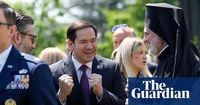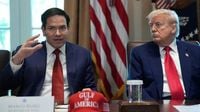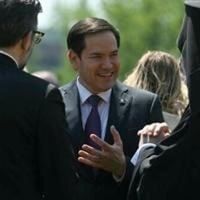In a significant reshuffling of his administration, President Donald Trump announced on Thursday, May 1, 2025, that he has nominated Michael Waltz to be the U.S. ambassador to the United Nations, while appointing Secretary of State Marco Rubio as interim national security adviser. This marks the first major personnel change of Trump's second term, as Waltz steps down amid growing scrutiny and internal tensions within the national security team.
Trump made the announcement via his social media platform, where he praised Waltz's contributions, stating, "I am pleased to announce that I will be nominating Mike Waltz to be the next United States Ambassador to the United Nations. From his time in uniform on the battlefield, in Congress, and as my National Security Advisor, Mike Waltz has worked hard to put our Nation's Interests first. I know he will do the same in his new role." He added, "In the interim, Secretary of State Marco Rubio will serve as National Security Advisor, while continuing his strong leadership at the State Department. Together, we will continue to fight tirelessly to Make America, and the World, SAFE AGAIN."
The move to replace Waltz comes on the heels of a scandal involving the encrypted messaging app Signal, where he inadvertently added a reporter from The Atlantic to a chat discussing sensitive military operations in Yemen. This incident has reportedly caused significant friction between Waltz and Trump, leading to Waltz's reassignment despite the president's earlier public support.
Waltz expressed his gratitude for the new nomination on X, stating, "I'm deeply honored to continue my service to President Trump and our great nation." However, his confirmation as U.N. ambassador will require Senate approval, and he may face tough questions regarding the Signal incident during hearings.
Vice President JD Vance spoke about the changes during an interview with Fox News, suggesting that if Trump had wanted to fire Waltz outright over the controversy, he would have done so. Vance noted, "We brought Mike on to do some serious reforms in the National Security Council. He has done that. I like Mike. I think he’s a great guy. He’s got the trust of both me and the president." He also added, "But we also thought that he’d make a better U.N. ambassador as we get beyond this stage of the reforms that we’ve made to the National Security Council." This statement reflects a belief within the administration that Waltz's skills may be better utilized in a diplomatic role rather than within the national security apparatus.
Rubio’s dual appointment as both Secretary of State and interim national security adviser makes him the first person since Henry Kissinger to hold both roles simultaneously. This unprecedented consolidation of power has raised eyebrows, particularly regarding how Rubio will manage the demands of both positions effectively. Critics have pointed out that juggling multiple high-profile roles can dilute focus and effectiveness.
At a National Prayer Event earlier that day, Rubio was seen engaged in discussions with White House officials, unaware that he was about to be appointed to yet another key role. State Department spokesperson Tammy Bruce learned of Rubio's new position during a press briefing, reacting in real time to the news that was breaking. "It is clear that I just heard this from you," Bruce said, praising Rubio as someone who has "worn several hats from day one" and is "well known by the president."
Waltz's departure follows a series of staff changes within the National Security Council, where over 20 personnel have been dismissed since April 1, 2025. This includes Waltz's deputy, Alex Wong, and several senior Pentagon officials. The director of the National Security Agency was also removed as part of the ongoing shake-up. The turmoil within the national security apparatus has raised concerns about the stability and coherence of U.S. foreign policy under Trump.
Waltz's tenure as national security adviser has been marked by controversy, particularly following the Signal incident, which revealed sensitive details about U.S. military operations. Trump had previously defended Waltz, stating he was a "good man" who had learned a valuable lesson from the ordeal. However, the internal review of the incident reportedly left Trump dissatisfied, prompting the decision to reassign Waltz.
As for Rubio, his ascent within the administration underscores the trust placed in him by Trump. He has become one of the most powerful figures in the cabinet, holding multiple titles, including acting administrator for the U.S. Agency for International Development (USAID) and acting archivist for the National Archives and Records Administration. This accumulation of roles raises questions about his ability to effectively manage such a broad portfolio, particularly in an administration known for its unconventional approach to governance.
Historically, the dual role of Secretary of State and national security adviser has been fraught with challenges, as seen during Kissinger's tenure. Critics argue that this concentration of power can lead to conflicts of interest and hinder effective governance, especially when it comes to preserving the integrity of sensitive information.
As the Trump administration continues to navigate these personnel changes, the implications for U.S. foreign policy remain uncertain. With Waltz poised to take on a new role at the U.N. and Rubio stepping into the national security adviser position, the administration is under scrutiny as it grapples with internal divisions and external pressures.
The dynamics within the national security team will be closely watched in the coming weeks, particularly as the administration prepares for critical diplomatic engagements and military decisions. The fallout from the Signal scandal and the broader implications for U.S. foreign policy will undoubtedly shape the narrative as Trump seeks to solidify his second term.
As the first 100 days of Trump's second term come to a close, the administration's approach to national security and foreign relations is being tested. The decisions made in the coming days will play a crucial role in defining the trajectory of U.S. policy on the global stage.






